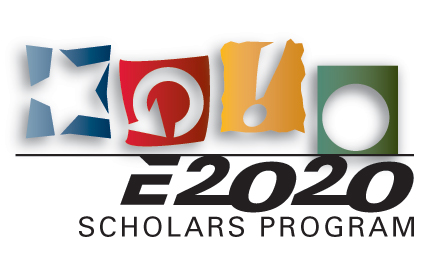The first of three rounds of scholarships were awarded for a cohort entering fall 2009. The scholarship application and selection processes are described in the annual reports. An online application that included essay questions pertaining to E2020 pillars was used. A selection committee reviewed and discussed every application. The entering cohorts included both direct-from-high-school (DFHS) and community college (CC) transfer students. The statistics for each cohort are summarized below.
2009 cohort
- 22 total, 14 DFHS students, 8 CC transfer students
- 4 women and 5 minority students
- 17 of 21 entering scholars remained in or completed the program as of 2013.
- 12 scholars graduated through spring 2013.
- 86% 3rd year retention in engineering; 81% 4th year retention in engineering; 90% retention at ISU as of 2013.
- 2 scholars changed to non-STEM majors (economics, history).
2010 cohort
- 26 total, 12 DFHS students, 14 CC transfer students
- 12 women and 4 minority students
- 24 of 26 entering scholars remained in or completed the program as of 2013.
- 10 scholars graduated through spring 2013; one scholar entered the concurrent BS/MBA program.
- 92% 2nd year retention in engineering; 81% 3rd year retention in engineering; 96% 3rd year retention in STEM; 100% retention at ISU as of 2013.
- 4 scholars changed to non-engineering STEM majors (biology, industrial design, math); 1 scholar changed to a non-STEM major (elementary education).
2011 cohort
- 25 total, 16 DFHS students, 9 CC transfer students
- 11 women and 3 minority students
- 24 of 25 entering scholars remained in the program as of 2013.
- One scholar graduated through spring 2013.
- 96% 1st year retention in engineering; 88% 2nd year retention in engineering; 96% 2nd year retention in STEM; 100% retention at ISU as of 2013.
- 2 scholars changed to non-engineering STEM majors (biology, math); 1 scholar changed to a non-STEM major (communication studies).
The scholarship awards were administered through the College of Engineering student services office. Scholars who switched to non-STEM majors were no longer eligible to receive an S-STEM scholarship. Scholars who switched to non-engineering STEM majors and who remained active in the program continued to receive a scholarship. Continuing eligibility also adhered to university policies, such as satisfactory academic progress. Overall, sixty-five of seventy-two scholars remained in the program, giving an overall retention of over 90% in the program as of 2013.

